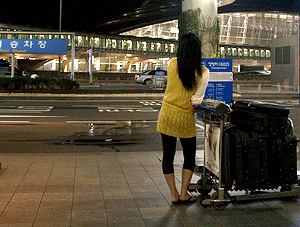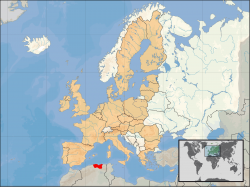 It is striking that in the year 2001 women should so overwhelmingly be seen as pushed, obligated, coerced or forced when they leave home for the same reason as men: to get ahead through work.
It is striking that in the year 2001 women should so overwhelmingly be seen as pushed, obligated, coerced or forced when they leave home for the same reason as men: to get ahead through work.
Sex trafficking and human trafficking were not words on everyone’s lips when I wrote the above ten years ago. I was trying to figure out what was special and problematic about migrants who sell sex, believing that migrants are migrants, no matter what jobs they end up getting (including prostitution or sex work). Nowadays, a lot of the social conflict is about statistics: how many are trafficked, how many are illegal migrants. But even more it is about definitions, world views, ideas about sex and money, the insistence that a particular cultural view should be everyone’s.
Most conversations about migrants who sell sex present black-and-white versions of something that is almost entirely grey. For moral crusaders who would rush to legislation or attempt to prove that one sort of law is better than others, my vision is not satisfying. I say Stop, slow down. Until you comprehend the myriad elements present amongst people who leave home to go to another country and sell sex, you shouldn’t be passing laws about them. Of any kind. This is not useless postmodern dithering but the position that until you understand the minimum about how people experience their own lives you cannot responsibly take actions to help them. If you don’t care what they say themselves then don’t talk about helping and admit that control is what you want: the power to make people stop doing what you don’t approve of and start doing something else, whether they want to or not.
Leaving Home for Sex is the first piece I published that defined what my work would be for the next few years. At the time it was unusual not to use the term prostitute, but I also didn’t just substitute the term sex worker. Instead, I tried to describe how selling sex can be an occupation that works out all right for migrant women without their taking on a definite identity based on it. You will see ‘Challenging place’ in the original title because the piece was written for a special journal issue on women and ‘place’, meaning the idea of place, local and global both. I suggested that migrant workers didn’t fit into that framework but could sometimes be viewed as cosmopolitan subjects: that neither poverty nor bad jobs nor lack of complete ‘choice’ over your life prevents you from also becoming cosmopolitan. There are some footnotes not hyperlinked but listed at the end of the text in full reproduced here. Click on the title to get the pdf.
 Laura Mª Agustín, Development, 45.1, 110-117 (2002).
Laura Mª Agustín, Development, 45.1, 110-117 (2002).
As soon as people migrate, there is a tendency to sentimentalise their home. Warm images are evoked of close families, simple household objects, rituals, songs, foods.[1] Many religious and national holidays, across cultures, reify such concepts of ‘home’ and ‘family’, usually through images of a folkoric past. In this context, migration is constructed as a last-ditch or desperate move and migrants as deprived of the place they ‘belong to’.Yet for millions of people all over the world, the birth and childhood place is not a feasible or desirable one in which to undertake more adult or ambitious projects, and moving to another place is a conventional—not traumatic—solution.
How does this decision to move take place? Earthquakes, armed conflict, disease, lack of food impel some people in situations that seem to involve little element of choice or any time to ‘process’ options: these people are sometimes called refugees. Single men’s decisions to travel are generally understood to evolve over time, the product of their ‘normal’ masculine ambition to get ahead through work: they are called migrants. Then there is the case of women who attempt to do the same.
Research in a marginal place: Geographies of exclusion
For some time I worked in educación popular in Latin America and the Caribbean and with latino migrants in North America and Europe, in programmes dedicated to literacy, AIDS prevention and health promotion, preparation for migration and concientización (whose exact translation does not exist in English but combines something about consciousness-raising with something about ‘empowerment’). My concern about the vast difference between what first-world social agents (governmental, NGO workers, activists) say about women migrants and what women migrants say about themselves led me to study and testify on these questions. I have deliberately located myself on the border of both groups: the migrants and the social, in Europe, where the only jobs generally available to migrant women are in the domestic, ‘caring’ and sex industries. My work examines both the social and the migrants, so I spend time in brothels, bars, houses, offices, ‘outreach’ vehicles and ‘the street’, in its many versions. Data on what migrant women say come from my own research and others’ in many countries of the European Union; women have also been interviewed before or after migrating in Latin America, Eastern Europe, Asia and Africa. Data on what social agents say come from my own research with those who work on prostitution issues in those countries, including as evaluator of projects for the International Labour Office and the European Commission.
Although researchers and NGO personnel have been working with migrant prostitutes for nearly twenty years in Europe, publication of their findings remains outside mainstream press and journals. Most of the people who have met and talked with many migrant prostitutes are neither academics nor writers. ‘Outreach’ is conceptualised as distinct from ‘research’ and generally funded as HIV/AIDS prevention. This means that the published products of outreach research are generally limited to information on sexual health and practices; the other many kinds of information collected remain unpublished. Some of those who work in these projects have the chance to meet and exchange such information, but most do not. Recently, a new kind of researcher has entered the field, usually young academic women studying sociology or anthropology and working on migrations. These researchers want to do justice to the reality around them, which they recognise as consisting of as many migrant prostitutes as migrant domestic/‘caring’ workers. Most of these researchers do oral histories and some have begun to publish but it will be some time before such findings are recognised. Stigma works in all kinds of ways, among them the silencing of results that do not fit hegemonic discourses.[2] The mainstream complaint says ‘the data is not systematised’ or ‘there is no data.’ In my research, I seek out such ‘marginalised’ results.
Discourses of leaving home
It is striking that in the year 2001 women should so overwhelmingly be seen as pushed, obligated, coerced or forced when they leave home for the same reason as men: to get ahead through work. Continue reading









